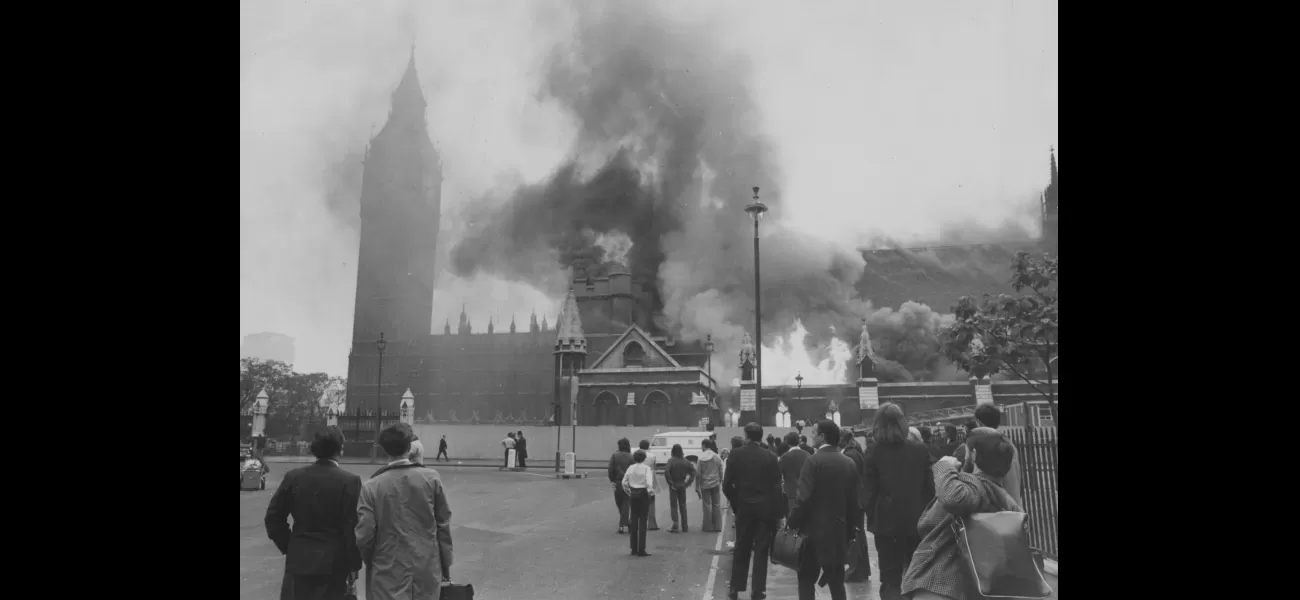Fifty years ago, an explosion nearly ruined the Houses of Parliament.
Bombing campaign against Londoners begins with attack.
June 16th 2024.

It only took a matter of seconds for chaos to erupt in the heart of the United Kingdom's democracy. It was fifty years ago when the House of Commons was plunged into darkness and confusion as an explosion rocked the chambers. The bomb, weighing 9.1 kg, was planted by the IRA in Westminster Palace, injuring 11 people and marking the beginning of a new wave of bombings in England.
The attack was swift and devastating, with the fire spreading rapidly through the 900-year-old central hall, the very heart of the UK's democracy. This was just one of the many bombings carried out by the IRA in 1974, making it one of the deadliest years in their campaign on British soil. Just a few months earlier, a bomb had exploded on a coach carrying soldiers, claiming the lives of 12 people. And towards the end of the year, 26 more people were killed in attacks on pubs in Guilford, Birmingham, and the Tower of London.
Thankfully, no one was seriously injured in the attack on Westminster as bystanders rushed to help the MPs and staff members caught up in the chaos. But the damage was extensive, with the blast fracturing a gas main and adding fuel to the already raging fire. The smoke engulfed famous landmarks, including Big Ben, shrouding the city in a thick haze.
David Steel, the then-Liberal Chief Whip, was inside the building when the bomb went off. He later recounted the harrowing experience, saying, "I looked through Westminster Hall and the whole room was filled with dust. Just a few minutes later, I could see flames shooting up through the windows."
Only a few minutes before the explosion, an anonymous caller with an Irish accent had phoned the Press Association, giving them a six-minute warning of the attack. The police recognized the IRA code word used in the warning, but with no specific location given, they had to scramble to evacuate everyone safely.
Just moments before the bomb detonated in an annex in the corner of Westminster Hall, the entire building was successfully evacuated. However, one construction worker, Patrick Arundel, was injured by broken glass. He later shared his experience with the New York Times, saying, "I heard a woman with a broken leg pleading for help. I got a ladder and climbed up to the first floor. I told her to try to crawl to the window, but she couldn't because of her injury. Luckily, a fireman came and pulled her out to safety."
The explosion was so powerful that it could be heard at Westminster and Lambeth stations, and centuries of dust were shaken loose from the hall's ancient walls. More than 100 firefighters were needed to contain the blaze, and the main concern was the central hall, the most historic part of the Houses of Parliament.
Despite the devastation and destruction, the attack only strengthened the resolve of the lawmakers. As Jeremy Thorpe, the leader of the Liberal party at the time, declared, "This House will not be bombed into a decision, but will continue to negotiate for peace."
The attack was swift and devastating, with the fire spreading rapidly through the 900-year-old central hall, the very heart of the UK's democracy. This was just one of the many bombings carried out by the IRA in 1974, making it one of the deadliest years in their campaign on British soil. Just a few months earlier, a bomb had exploded on a coach carrying soldiers, claiming the lives of 12 people. And towards the end of the year, 26 more people were killed in attacks on pubs in Guilford, Birmingham, and the Tower of London.
Thankfully, no one was seriously injured in the attack on Westminster as bystanders rushed to help the MPs and staff members caught up in the chaos. But the damage was extensive, with the blast fracturing a gas main and adding fuel to the already raging fire. The smoke engulfed famous landmarks, including Big Ben, shrouding the city in a thick haze.
David Steel, the then-Liberal Chief Whip, was inside the building when the bomb went off. He later recounted the harrowing experience, saying, "I looked through Westminster Hall and the whole room was filled with dust. Just a few minutes later, I could see flames shooting up through the windows."
Only a few minutes before the explosion, an anonymous caller with an Irish accent had phoned the Press Association, giving them a six-minute warning of the attack. The police recognized the IRA code word used in the warning, but with no specific location given, they had to scramble to evacuate everyone safely.
Just moments before the bomb detonated in an annex in the corner of Westminster Hall, the entire building was successfully evacuated. However, one construction worker, Patrick Arundel, was injured by broken glass. He later shared his experience with the New York Times, saying, "I heard a woman with a broken leg pleading for help. I got a ladder and climbed up to the first floor. I told her to try to crawl to the window, but she couldn't because of her injury. Luckily, a fireman came and pulled her out to safety."
The explosion was so powerful that it could be heard at Westminster and Lambeth stations, and centuries of dust were shaken loose from the hall's ancient walls. More than 100 firefighters were needed to contain the blaze, and the main concern was the central hall, the most historic part of the Houses of Parliament.
Despite the devastation and destruction, the attack only strengthened the resolve of the lawmakers. As Jeremy Thorpe, the leader of the Liberal party at the time, declared, "This House will not be bombed into a decision, but will continue to negotiate for peace."
[This article has been trending online recently and has been generated with AI. Your feed is customized.]
[Generative AI is experimental.]
0
0
Submit Comment





